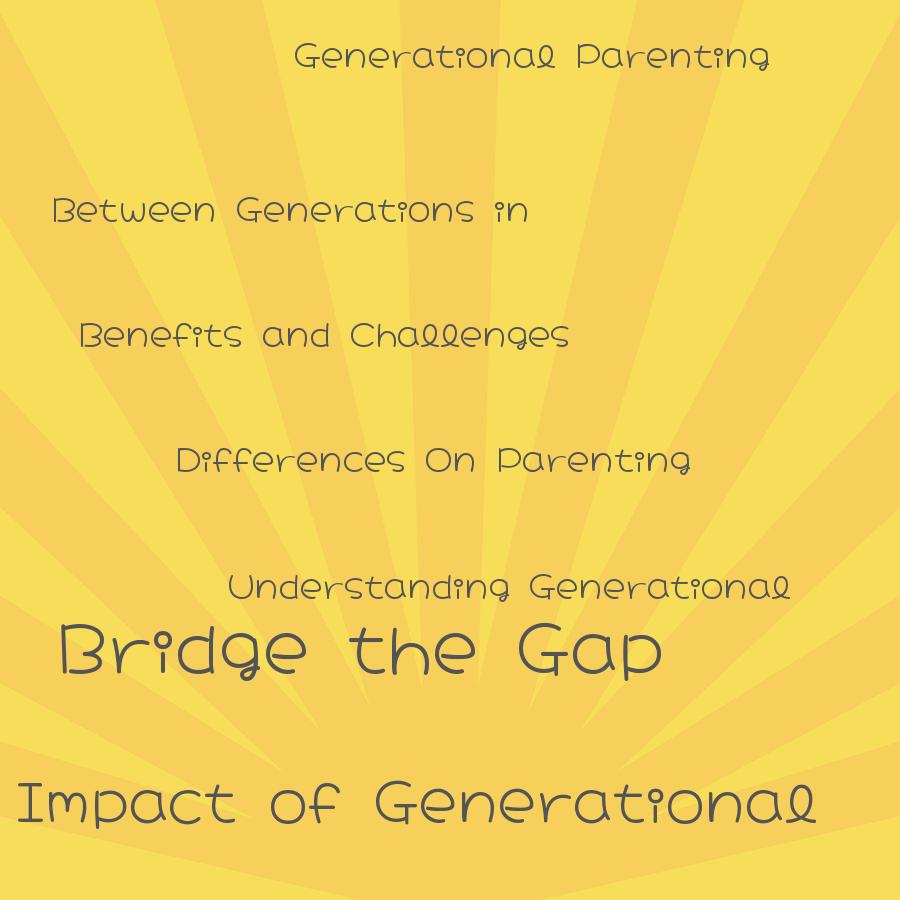Generational parenting is a style of raising children that is influenced by the values, beliefs, and practices passed down from previous generations within a family.
As I sat at the dinner table with my parents and grandparents, I couldn’t help but notice the stark differences in our attitudes towards parenting. My grandparents were strict and authoritarian, while my parents were more lenient and open-minded.
This got me thinking about how parenting styles have evolved over time, and how each generation approaches this crucial role in their own unique way.
Generational parenting is a term that refers to the different approaches to parenting that have emerged across different generations. Each generation has its own set of beliefs, values, and experiences that shape their approach to raising children.
From baby boomers to millennials, each generation has left its mark on parenthood.
In this blog post, we’ll explore what generational parenting is all about and delve into some of the key differences between each generation’s approach. So grab a cup of coffee (or tea!) and let’s dive right in!
Here You Will Learn:
Understanding Generational Parenting

Understanding generational parenting is all about recognizing the different approaches to raising children that have emerged across different generations. Each generation has its own unique set of values, beliefs, and experiences that shape their approach to parenthood.
For example, my grandparents’ generation grew up during a time when discipline was seen as the cornerstone of good parenting. They believed in strict rules and consequences for disobedience.
On the other hand, my parents’ generation came of age during a time when individualism and self-expression were highly valued. They tended to be more lenient with their children’s behavior and encouraged them to explore their interests.
Today’s millennial parents are often characterized by an emphasis on emotional intelligence and open communication with their children. This shift towards empathy-based parenting reflects broader societal changes towards greater awareness around mental health issues such as anxiety or depression among young people.
Understanding these differences can help us appreciate how each generation has contributed something valuable to our understanding of what it means to be a good parent – whether it’s instilling discipline or fostering creativity – while also acknowledging where there may be room for improvement in our own approach based on current research findings or changing social norms over time
The Impact of Generational Differences On Parenting Styles
How to Bridge the Gap Between Generations in Parenting
1. Communication: The first step towards bridging any divide is communication.
Talk openly about your beliefs and values regarding parenting without being judgmental.
2. Respect each other’s opinions: It’s crucial to respect each other’s opinions even if they differ from yours.
3. Find common ground: Look for areas where both parties can agree upon such as instilling good manners or teaching children responsibility.
4.Educate yourself on new trends : As times change so do trends in child-rearing practices; educate yourself on these changes so that you can understand why younger generations parent differently than older ones
By following these steps, we can create a more harmonious environment where everyone feels heard and valued regardless of their age group or background
The Benefits and Challenges of Generational Parenting
While generational parenting can bring about a lot of benefits, it also comes with its own set of challenges. One major benefit is the opportunity for parents to learn from their own upbringing and make changes accordingly.
For example, my parents grew up in households where strict discipline was the norm, but they chose to take a more relaxed approach with me and my siblings. On the other hand, one challenge that arises from generational parenting is conflicting beliefs between generations.
My grandparents often disagreed with my parents’ lenient approach to discipline and felt that we were being spoiled as a result. Another challenge is keeping up with changing times and technologies.
As each generation grows up in different eras, there may be differences in how they view certain aspects of life such as social media or technology usage which could lead to disagreements on what’s appropriate for children at different ages. Despite these challenges though, I believe that generational parenting has allowed us all to grow together as families while still respecting each other’s unique perspectives on raising children.
Breaking the Cycle: Overcoming Negative Patterns in Family Dynamics
As I observed the different parenting styles at my family dinner, I couldn’t help but notice that some of the negative patterns in our family dynamics were being repeated across generations. My grandparents’ strict and authoritarian approach had caused tension and resentment among their children, who then adopted a more relaxed style with their own kids.
However, this leniency sometimes led to permissiveness and lack of boundaries. Breaking these negative patterns is crucial for healthy family dynamics.
It requires self-awareness and a willingness to change old habits that may not be serving us or our children well. This can involve seeking therapy or counseling to work through past traumas or unresolved issues.
It’s important to remember that generational parenting isn’t just about following trends or blindly adopting new approaches; it’s about understanding where we come from while also striving for growth and improvement as parents. By breaking the cycle of negative patterns in our families, we can create healthier relationships with ourselves, our partners, and most importantly – with our children!